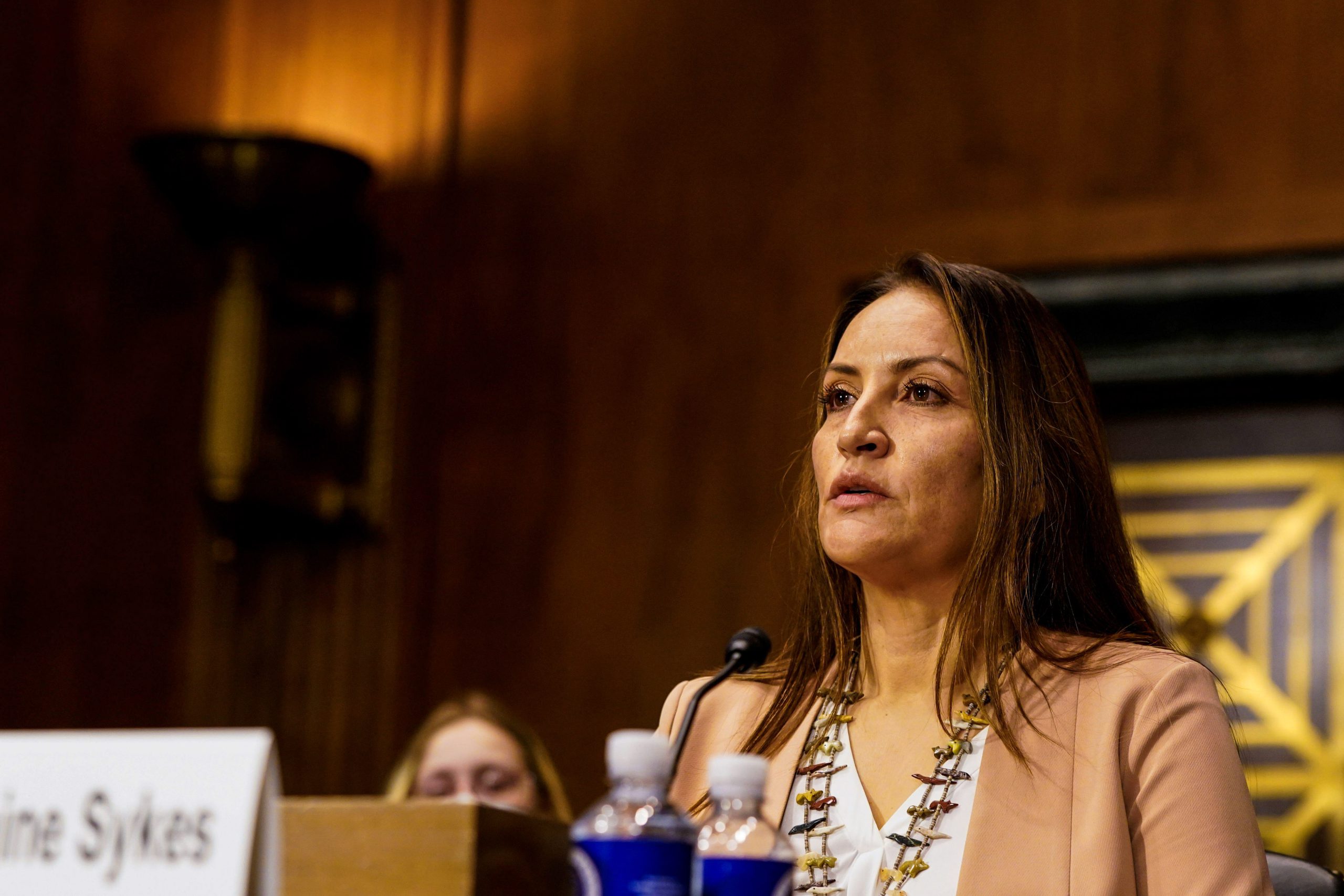Indianz.Com > News > Native judge awaits movement on historic nomination to federal bench
Native judge awaits movement on historic nomination to federal bench
Monday, March 7, 2022
Indianz.Com
WASHINGTON, D.C. —
The Senate Committee on the Judiciary has once again scheduled a meeting to advance the nomination of another Native woman to the federal bench.
Sunshine Suzanne Sykes, a citizen of the Navajo Nation, has been waiting for committee movement for more than a month. Her confirmation hearing took place on February 1, when she spoke of her immense pride in her tribal background.
“I would not be here today without the sacrifices and resilience of so many that came before me,” Sykes said in her opening statement to the committee.
“I come from a long line of strong Mą’ii deeshgiizhinii Navajo women,” she added, using the Navajo language term for her clan.
“The seed that brought me here existed long ago,” Sykes said at the hearing in the nation’s capital. “It was held by my ancestors and nurtured by my great-grandmother, when she raised her family while tending sheep on the Navajo Reservation.”
“It grew in my grandmother as she entered life at Indian boarding schools,” Sykes said in reference to one of the many strong Navajo women in her background. “It sprouted in my mother when, as a little girl, I saw her strength — even when she herself thought she had none — and it flourished in me.”

Senate Committee on the Judiciary Notice
Executive Business Meeting (March 10, 2022)
Related Stories
Tribal leaders hail historic nomination of Native woman to federal bench (December 17, 2021)President Biden nominates another Native woman to federal bench (December 15, 2021)
Search
Filed Under
Tags
More Headlines
Native America Calling: Tribes vie for better access to traditional plants
Senate committee schedules confirmation hearing for Interior nominee
Fact Sheet: Department of Health and Human Services to undergo ‘dramatic restructuring’
Press Release: Department of Health and Human Services to undergo ‘dramatic restructuring’
Native America Calling: The new Social Security reality for Native elders
Montana Free Press: Hip-hop artist Foreshadow celebrates latest release
Cronkite News: Bill creates alert system for missing and murdered relatives
Bureau of Indian Affairs approves HEARTH Act regulations for Mohegan Tribe
House Subcommittee on Indian and Insular Affairs sets field hearing for self-determination anniversary
Native America Calling: Sometimes, COVID doesn’t go away
Native America Calling: The changing landscape for subsistence hunting and fishing
Press Release: AIHEC ‘deeply concerned’ about closure of Department of Education
Press Release: Oklahoma Indian Gaming Association weighs in on sports betting legislation
Press Release: Sen. Mike Rounds (R-South Dakota) calls for commission on crime in Indian Country
Press Release: Sen. Schatz (D-Hawaii) criticizes closure of Department of Education
More Headlines
Senate committee schedules confirmation hearing for Interior nominee
Fact Sheet: Department of Health and Human Services to undergo ‘dramatic restructuring’
Press Release: Department of Health and Human Services to undergo ‘dramatic restructuring’
Native America Calling: The new Social Security reality for Native elders
Montana Free Press: Hip-hop artist Foreshadow celebrates latest release
Cronkite News: Bill creates alert system for missing and murdered relatives
Bureau of Indian Affairs approves HEARTH Act regulations for Mohegan Tribe
House Subcommittee on Indian and Insular Affairs sets field hearing for self-determination anniversary
Native America Calling: Sometimes, COVID doesn’t go away
Native America Calling: The changing landscape for subsistence hunting and fishing
Press Release: AIHEC ‘deeply concerned’ about closure of Department of Education
Press Release: Oklahoma Indian Gaming Association weighs in on sports betting legislation
Press Release: Sen. Mike Rounds (R-South Dakota) calls for commission on crime in Indian Country
Press Release: Sen. Schatz (D-Hawaii) criticizes closure of Department of Education
More Headlines
